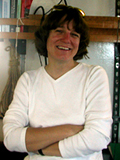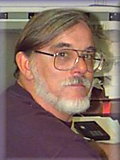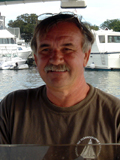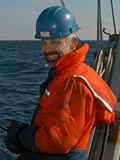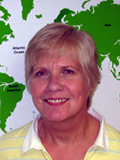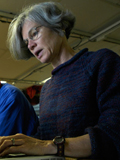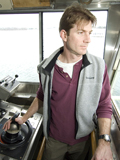Just as a baseball team needs many players with different talents—pitcher, catcher, short-stop, outfielder—oceanographers like me need a team of other scientists and engineers to probe the depths of the oceans. Let’s meet my team!
Amy Bower
That’s me, Dr. Amy Bower. I have a Ph.D., which means I went to school for several years after college to learn as much as I could about oceanography. Because I am mostly interested in ocean currents, I studied that subject the hardest. That makes me what is called a physical oceanographer—I apply my knowledge of physics to help me understand how the ocean currents work. Other oceanographers study the biology, chemistry and geology of the oceans, or a combination of these. My job is to figure out what —and how— we oceanographers can learn about ocean currents, so we can understand how Earth works, and how we can wisely use the oceans to help society. Once I have an idea of what should be studied or measured next, I have to work hard to convince other oceanographers that my idea is a good one and that it is worth spending money on. Once I have the money to build new instruments and conduct my experiments, I get my team together.
Jim Valdes
Jim Valdes is a senior engineer that I have worked with for many years. No, he’s not an engineer of a train!, instead he is an engineer who builds things, usually new electronic and mechanical devices that are used to measure ocean currents. He went to college to study engineering and has many years of experience. We work very closely together to come up with the best new technology for making the measurements I need.
Scott Worrilow
Scott Worrilow is another engineer on the project. Scott‘s job is to make sure the sensors that will measure ocean currents and temperature are all working perfectly before we put them in the ocean. There are lots of details that he needs to keep track of—when the sensors were bought, when they were last used, how they are performing, whether they need new batteries. He keeps notebooks of all this information so that he can stay organized.
Will Ostrom
Will Ostrom has a lot of experience launching heavy scientific gear from research ships. He is going on the cruise with me and Jim Valdes to make sure all the scientific instruments are launched safely and successfully. He will have the job of “deck boss”—a job kind of like the person in charge of jets taking off and landing on an aircraft carrier! He will be completely in charge on the deck of the ship when it’s time to put the gear in the water. This can be a very dangerous operation unless someone like Will is in charge. Everyone has to listen to him and do what he says—no questions asked!
Kate Fraser
Kate Fraser is a science teacher from Perkins School for the Blind. We are very excited to have a teacher on our cruise, who will help us communicate with students back in their classrooms. We hope to give the students some idea of what it is really like to do science at sea by sending e-mail, making phone calls from the ship to the classroom by satellite phone and creating “audio postcards” of interviews and other sounds from the ship that will be posted on the OceanInsight Web page every day.
Terry McKee
Terry McKee is a research assistant. She helps me with everything! She is setting up the computers back on land that will receive data from the instruments at sea. She helps to keepall the paperwork for the cruise up to date. Terry will also be the “go-between” when we are at sea, posting e-mails and audio postcards on the OceanInsight Web page and sending us students’ questions.
Kent Sheasley
Kent Sheasley is the captain of the research vessel Knorr and just one of the many crew members that operate the ship. Knorr is the ship we will be on to launch our scientific gear near Greenland. Captain Sheasley is responsible for everything that goes on during our cruise. He works with a crew of about 24 men and women, from cooks to mates to ship’s engineers (these are like train engineers but for ships’ engines). All the crewmembers want our trip to be successful and will do whatever they can to help.
More team members will be introduced later. All of these people are working in oceanography in one way or another, demonstrating that there are lots of different kinds of jobs in science. I depend on all of the team members to do my research. I could never do it all by myself.

